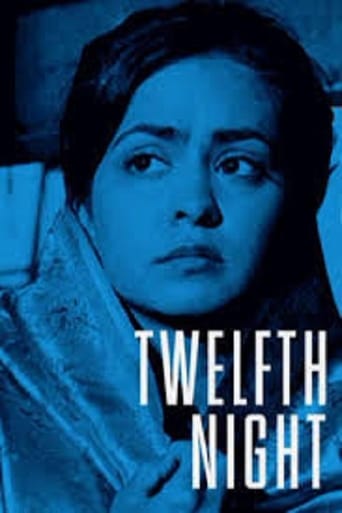mf_imdb
This production has two major failings: first, and foremost, the tone is somber and the pacing is leaden (especially at the end). It is sometimes interesting but never funny--hardly a ringing endorsement of a comedy.The bigger failing, though, is the whole production is constantly, and blatantly, artificial. The three groups of characters are racially segregated--Orsino and his court are black, Olivia and her court are white, and Viola/Sebastian are Indian. Why? Is the director exploring the theme that black men always want white women? Is Viola-as-Caesario having trouble fitting in in Orsino's court because she is the only non-black? Indians are always in need of assistance? All Indians look alike? The answer to all these is obviously no: there is absolutely no deeper meaning to the casting than the desire to do something different.There are also many sequences of fast cuts, and flashbacks, that get in the way of the story.The acting is decent, but lacking subtlety.Definitely not the best Twelfth Night out there.
pariah231
Normally, modern adaptations of Shakespeare tend to be clunky and forced; Baz Luhrmann's "Romeo + Juliet" and Michael Almereyda's "Hamlet" are perfect testament to this. Even Richard Loncraine's "Richard III" falls on dull devices trying to place the action of that play in the imagined setting of World War Two. Perhaps it is that the tragedies and histories do not lend themselves well to being updated or embellished (see Julie Taymore's "Titus") and would best be left as they are.This adaptation of Twelfth Night, however, benefits greatly from the liberties Andrew Bannerman and Tim Supple take with it. Not only is the story better for the adaptation, but the songs are beautifully rendered and the acting and stage direction is superb.Also incredible is how much they accomplished with so little. This is quite obviously a low budget television adaptation with only a dozen or so sets and very few frills, but what the producers and directors manage to achieve with so little is startling. Whatever Bannerman and Supple made this for could not have exceeded the cost of a luxury car, but the film is a far better ride.
carpet_seller
I am not a fan of putting Shakespeare's language into a modern setting. I didn't like the modern Romeo&J, however, I did like Kurosawa's version of King Lear because he didn't use the olde language. I have been watching this version for over an hour now and I have been moderately interested in it but mostly bored. I have no knowledge of the play itself, this film has just made me think that I would like to see the play in it's original form, for this version is too confusing and boring. I like the way Hindi has been spliced into the dialogue. The film does not hold itself up. Not knowing the original story is a problem because this version does make it all confusing. If you are the same then don't start with this one. I would say this version is for those arty people who know what they are talking about and are able to judge scene by scene how this director has managed to interpret the original play.
indiegal
I have always liked Shakespeare's Twelfth Night - it's my favourite play. As such, I have seen many versions of it, both on film and in the theatre. With a play as old as Shakespeare's are, that's performed as much as this one is, it's difficult to get an adaptation that's new. I think this version managed to do that without taking it so far out of context that it didn't make any sense. I really enjoyed this version, as it was completely different to any I've ever seen before. I thought the leading cast members were all very good, especially Parminder Nagra who plays Viola. I loved the setting and agree with the decision to leave the Shakespearean language, as I think modernising language in Shakespeare never works - I have never seen one that does. The language is as much a part of the play as the plot. Overall, I don't think it was quite as good as the 1996 film directed by Trevor Nunn, but that's setting an impossible standard.


